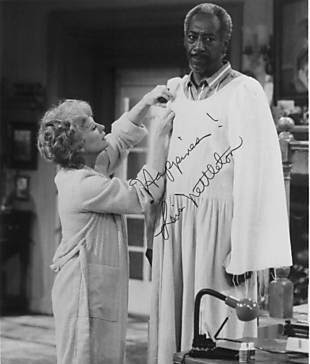
Lois Nettleton and Robert DoQui in an episode from Norman Lear's 1977 ensemble comedy, "All That Glitters" (a still signed by Nettleton)For no good valid reason, other than I want to, I'm going to take a break from my usual obsession with forgotten films and briefly venture into the more rarified area of forgotten television. Actually, this is a subject that Stephen Bowie covers with some expertise on his remarkable site, The Classic TV History Blog: Dispatches From the Vast Wasteland.
Every once in a while, when I least expect it, my mind drifts towards lost '60s sitcoms from my distant youth:
Ezra Stone's "The Hathaways" (1961-62), in which the inimitable team of Peggy Cass and Jack Weston plays parents to a family of chimps; Gary Nelson's "Occasional Wife" (1966-67), in which Michael Callan makes like Jack Lemmon as a careerist who enlists Patricia Harty to pretend to be his wife to help him in his job, and David Swift's "Camp Runamuck" (1965-66), a minor classic about deranged camp counselors, among them comics Dave Ketchum and Dave Madden - and Nina Wayne as Caprice Yodelman. Isn't it remarkable the things that one remembers?
Then there's Norman Lear's short-lived attempt to tranpose Lanford Wilson's raunchy, eclectic play about lowlifes, "Hot L Baltimore" (1975), to the small screen, with a dream cast that included James (then Jamie) Cromwell, Conchata Ferrell (from the play) and Richard Mazur.
But the title that I miss the most is Lear's trailblazing 1977 series, "All That Glitters," an inventive gender-bender that, not surprisingly, lasted only one season. Lear may be better known for "All in the Family," "Maude" and the surreal soap, "Mary Hartman, Mary Hartman," but "All That Glitters" is arguably his best, despite its status as a nonentity these days. It ran for one season ... in a late-night slot ... in syndication.
The premise was simple. The sex roles were reversed, with women behaving like dominant alpha males, running companies and the world (and having casual affairs because they earned them and because, well, they can), and the men staying home and knowing their place. Playing on the edge, the show introduced Linda Gray (who, of course, would go on to do "Dallas") as a transsexual - a woman who was once a man.
The series' two house directors were Herbert Kenwith, a sitcom specialist of the era ("Good Times" and "Diff'rent Strokes"), and James Frawley, who had directed such eccentric titles as "The Christian Licorice Store," "Kid Blue," "The Big Bus" and "The Muppet Movie."
In addition to Gray, Lear's game, delicious cast included Barbara Baxley, Eileen Brennan, Lois Nettleton, Jessica Walter, Anita Gillette and Louise Shafer as the women, and a hilarious Chuck McCann, David Haskell, Tim Thomerson, Gary Sandy and Greg Evigan as the guys. Absolutely golden.
That's why it glittered.
No comments:
Post a Comment